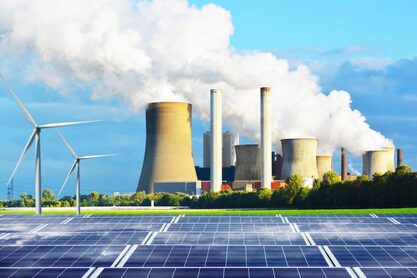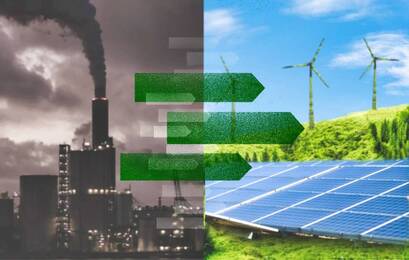
If you read about climate change, you've probably come across the hopeful term "energy transition." Generally, it refers to a national or global shift from a reliance on fossil fuel sources of energy to renewable forms of energy. For the purposes of addressing climate change, this means that over time a smaller amount of fossil fuels is burned while a greater amount of renewables are employed. Eventually, renewables dominate and fossils fuels are a minor input. That is the essence of any transition, the movement from one state to another.
Mainstream media in the U.S. uses the "energy transition" term prodigiously as they report on the growth of renewable energy, which has been remarkable. Publications by corporations and nonprofits toss the term about like a frisbee on a college lawn. It's tripping from the mouths of scientists, activists, politicians, PR hacks and lobbyists. From David Wallace-Wells, the high priest of climate change punditry at The New York Times, and from the oil company Shell which, by the way, is burnishing its green image by helping to fund climate start-up companies at Greentown Labs, just down the street from my home in Somerville, Mass. Google it for yourself: energy transition. You'll find lots of cool logos, illustrations, dioramas and videos, too.
Here we go, the energy transition!

But why, you might ask, does all this picky-picky accounting matter? We're going green and the rest will fall into place, right?
No, it won't. Maybe it can be made to "fall into place," but that won't happen if everyone is engaged in a mass delusion that we're on some wonderful, green transition road. The accounting matters because it's irresponsible, as well as a pathetic lie, to assert that something is happening when it's not. A lots at stake here, after all. Millions of lives, modern civilization, that kind of thing.
And if that's too general, let's put it this way: your adorable children or grandchildren may die horrible deaths from the effects of climate change.
All right, back to basics. A transition has two moving parts, the increase and the decrease. Therefore, a transition doesn't occur by only adding to one part. You’re not transitioning away from a golf addiction by continuing to golf 18 holes per day but adding a half-hour of yoga or mindful listening to your spouse. You’re not transitioning away from junk food by keeping your diet the same but scarfing down celery sticks. You’re not transitioning away from smoking by inhaling your usual three packs but also doing 40 or 400 or 4,000 jumping jacks. And, drumroll, you’re not transitioning away from fossil fuels by keeping carbon emissions the same (or higher) while building up an impressive, parallel renewable energy sector.
Renewable energy does not dilute the effects of greenhouse gases. It's a necessary component of the energy transition -- just as eating healthy food may lead someone to cut down on junk food, just as exercise might be a key step in preparing to quit cigarettes -- but by itself renewable energy does nothing, nothing, nothing to address climate change.

There is, alas, no energy transition. There will be one, however, when the world starts to cut back, and cut back drastically, on the use of fossil fuels. Accomplishing that will be an epic struggle.
Happy 2024!
 RSS Feed
RSS Feed